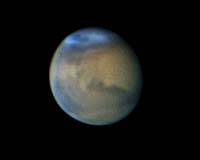 |
Washington (AFP) June 18, 2009 US researchers have uncovered traces of an ancient lake on Mars boosting hopes of discovering evidence that billions of years ago the Red planet hosted life. The lake, which dates back some 3.4 billion years, appears to have covered as much as 80 square miles (207 sq kilometers) and was up to 1,500 feet (500 meters) deep, said the team from the University of Colorado. "This is the first unambiguous evidence of shorelines on the surface of Mars," said Boulder research associate Gaetano Di Achille in a study published in the latest edition of Geophysical Research Letters. "The identification of the shorelines and accompanying geological evidence allows us to calculate the size and volume of the lake, which appears to have formed about 3.4 billion years ago." Analysis of the images has shown the water carved out the canyon in which it was found, which then opened out into a valley depositing sediment which formed a delta. "Finding shorelines is a Holy Grail of sorts to us," said assistant professor Brian Hynek, adding it showed the lake existed at a time when Mars was thought to have been cold and dry. "Not only does this research prove there was a long-lived lake system on Mars, but we can see that the lake formed after the warm, wet period is thought to have dissipated." Scientists believe the oldest surfaces on Mars formed during the wet and warm era known as the Noachan epoch, about 4.1 billion to 3.7 billion years ago, that featured a bombardment of large meteors and extensive flooding. The newly discovered lake is believed to date from the Hesperian era and postdates the end of the warm and wet period on Mars by 300 million years, according to the study. Scientists believe deltas next to the lake may well hold secrets about past life on Mars as such places on Earth have become the natural deposits of organic carbon and other markers of life. "On Earth, deltas and lakes are excellent collectors and preservers of signs of past life," said Di Achille. "If life ever arose on Mars, deltas may be the key to unlocking Mars' biological past." The US orbiter Mars Odyssey was the first to detect the presence of ice on Mars' north pole in 2002, and in 2008 the Phoenix probe in 2008 confirmed that frozen water existed in the Martian arctic. Share This Article With Planet Earth
Related Links Mars News and Information at MarsDaily.com Lunar Dreams and more
 Evidence For Liquid Water On Early Frozen Mars
Evidence For Liquid Water On Early Frozen MarsSunnyvale CA (SPX) Jun 01, 2009 NASA scientists modeled freezing conditions on Mars to test whether liquid water could have been present to form the surface features of the Martian landscape. Researchers report that fluids loaded with dissolved minerals containing elements such as silicon, iron, magnesium, potassium and aluminum, can remain in a liquid state at temperatures well below freezing. The results of this resear ... read more |
|
| The content herein, unless otherwise known to be public domain, are Copyright 1995-2009 - SpaceDaily. AFP and UPI Wire Stories are copyright Agence France-Presse and United Press International. ESA Portal Reports are copyright European Space Agency. All NASA sourced material is public domain. Additional copyrights may apply in whole or part to other bona fide parties. Advertising does not imply endorsement,agreement or approval of any opinions, statements or information provided by SpaceDaily on any Web page published or hosted by SpaceDaily. Privacy Statement |